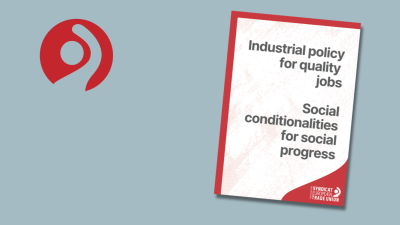
Trade unions call for a European industrial policy for quality jobs. Social conditionalities are a fundamental building block for an effective industrial policy. It must be guaranteed that taxpayers' money is used to pursue the common good, including when supporting companies. One of the tools to achieve this is social conditionalities.
The ETUC calls for social conditionalities to be introduced for all forms of public funding and support to companies, as well as environmental and tax conditionalities.
International, EU and national examples and precedents have proven that social conditionalities work for both the economy and working people. Enrico Letta’s report “Much more than a market” highlights the important role that social conditionalities should play and stresses the positive example of the US Inflation Reduction Act in this area. Successful practices and examples can also be found at national level in the EU. Workers’ and collective agreements are mentioned as one of the possible objectives of such conditionalities. The EU institutions should build upon these recommendations.
Social conditionalities are a key objective for the trade union movement not only at EU level, but also at national level, for countries both inside and outside the European Union.
